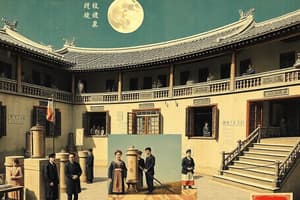Podcast
Questions and Answers
Who is known for his teachings on ethics and governance in ancient China?
Who is known for his teachings on ethics and governance in ancient China?
Confucius
What is the Japanese tea ceremony known as?
What is the Japanese tea ceremony known as?
chanoyu
Which influential figure played a crucial role in the unification of Japan during the Sengoku period?
Which influential figure played a crucial role in the unification of Japan during the Sengoku period?
Oda Nobunaga
During which Chinese dynasty did Buddhism from India spread to China?
During which Chinese dynasty did Buddhism from India spread to China?
What significant event in the late Ming Dynasty saw a resurgence of Chinese culture after a period of foreign domination?
What significant event in the late Ming Dynasty saw a resurgence of Chinese culture after a period of foreign domination?
Who led India to independence through nonviolent civil disobedience?
Who led India to independence through nonviolent civil disobedience?
Which ancient civilization emerged around 4500 BCE in what is now southern Iraq?
Which ancient civilization emerged around 4500 BCE in what is now southern Iraq?
Where did the Indus Valley Civilization thrive between 3300 and 1300 BCE?
Where did the Indus Valley Civilization thrive between 3300 and 1300 BCE?
During which dynasty did archaic Chinese culture start to form around 2070 BCE?
During which dynasty did archaic Chinese culture start to form around 2070 BCE?
Who led the Mongol invasion from 1206 to 1295 CE that greatly influenced the orient's landscape?
Who led the Mongol invasion from 1206 to 1295 CE that greatly influenced the orient's landscape?
Name one other civilization besides Sumeria that developed in the orient.
Name one other civilization besides Sumeria that developed in the orient.
Which region did the Babylonians, Assyrians, and Hittites develop in?
Which region did the Babylonians, Assyrians, and Hittites develop in?
Study Notes
History and Development of Oriental History
Oriental history encompasses the history of several regions located in Asia, including China, Japan, Korea, Vietnam, India, Thailand, Malaysia, Indonesia, and Singapore. This vast region has been home to numerous ancient civilizations, significant historical events, unique traditions and customs, and influential figures who have shaped its history. Here we will delve into these aspects of oriental history.
Ancient Civilizations
The earliest known civilization within the orient is Sumeria, which emerged around 4500 BCE in what is now southern Iraq. Over time, various other civilizations such as the Akkadians, Elamites, Ur III Empire, Babylonians, Assyrians, and Hittites also developed in the area. In South Asia, the Indus Valley Civilization thrived between 3300 and 1300 BCE in present-day Pakistan and northwestern India. Further east, archaic Chinese culture started to form during the Xia Dynasty around 2070 BCE. These ancient civilizations laid the groundwork for future developments in art, science, religion, and governance across the orient.
Historical Events
One major event was the Mongol invasion led by Genghis Khan from 1206 to 1295 CE, which created a widespread empire that stretched across Asia, Eastern Europe, and the Middle East. This period drastically influenced the political, economic, and cultural landscape of the orient. Another significant event was the Renaissance of the late Ming Dynasty in the 16th century, which saw a resurgence of Chinese culture after a period of foreign domination.
Traditions and Customs
Certain traditions like the Chinese New Year and the Japanese tea ceremony have become globally recognized. The Chinese New Year is celebrated with feasts, family gatherings, and the giving of red envelopes filled with money. The Japanese tea ceremony, known as "chanoyu," involves the preparation and presentation of matcha, a powdered green tea, in a formal setting. These traditions are deeply rooted in the oriental culture and are often passed down through generations.
Influential Figures
Throughout history, many influential figures have shaped the course of oriental history. Confucius (551-479 BCE), a Chinese philosopher, is known for his teachings on ethics and governance. In Japan, Oda Nobunaga (1534-1582) played a crucial role in the unification of Japan during the Sengoku period. In India, Mahatma Gandhi (1869-1948) led the country to independence through nonviolent civil disobedience.
Cultural Exchanges
Cultural exchanges have played a vital role in shaping oriental history. One notable exchange was the Marco Polo trade route between Europe and Asia, which facilitated the spread of goods, ideas, and technologies. Another significant exchange occurred during the Song Dynasty in China, when Buddhism from India spread to China. These exchanges have enriched the oriental cultures and have led to the growth of new artistic, scientific, and philosophical ideas.
In conclusion, oriental history is a complex and diverse field of study. From the ancient civilizations that shaped the region to the influential figures who have led the way, the orient has a rich and fascinating history. Understanding these aspects of oriental history provides valuable insights into the region's past, present, and future.
Studying That Suits You
Use AI to generate personalized quizzes and flashcards to suit your learning preferences.
Description
Delve into the history, ancient civilizations, historical events, traditions, influential figures, and cultural exchanges of oriental regions such as China, Japan, Korea, India, and more. Learn about the diverse and rich history that has shaped the orient through centuries.



